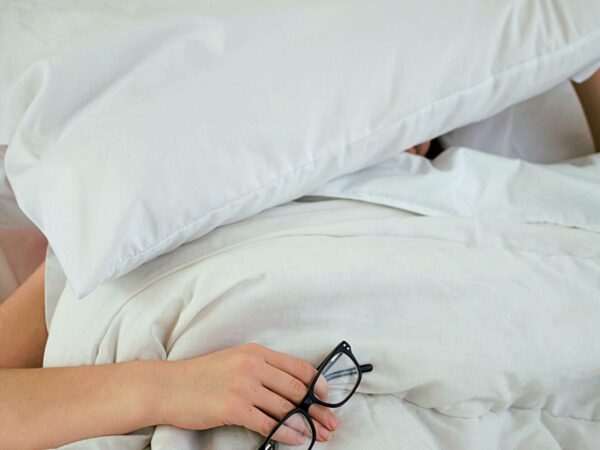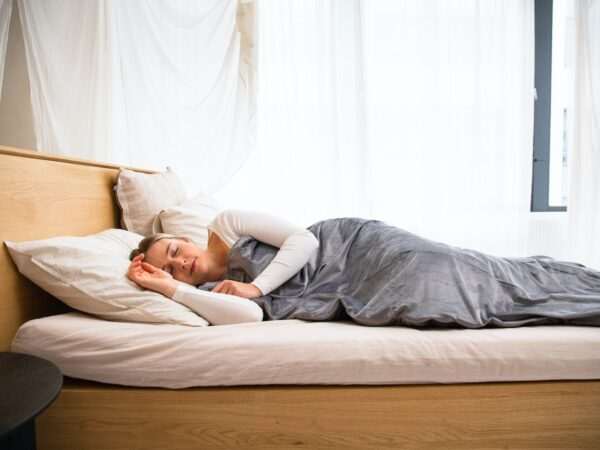Summary. Whether it’s 8 hours or 6, a consistent sleeping routine is essential for a restful night’s sleep. Studies have shown that planning a regular sleep schedule – going to bed at roughly the same time each night and waking up at the same time each morning – is the best way to ensure a good night’s sleep. Your environment and lifestyle habits should also be taken into account when crafting a sleep routine that caters to your needs. Creating the perfect sleeping routine is easy and can play a major role in your health, wellbeing, and productivity.
Do you want to wake up feeling energetic, refreshed, and ready to take on the day? If the answer is yes, then having a good sleeping routine could be the key to achieving those goals! What is the best sleeping routine? What can we do to help ourselves achieve a good night’s rest and waking up feeling refreshed? Having the right sleeping pattern and environment can dramatically improve how rested we feel in the morning. A good sleeping routine is all about developing healthy habits and making sure that we are getting the right amount of sleep each night.
Creating a good sleeping routine isn’t just about getting the right amount of sleep. It’s also important to establish good habits and ensure we stick to them. Things like creating a calming bedtime routine, avoiding caffeine and stimulants close to bedtime, and maintaining a comfortable bedroom environment, can all add up to great results. Developing a good sleeping routine may seem like a lot of work, but taking the time to work on it can be life-changing. Investing in yourself and your well being is worth it in the long run, so take the time to make a plan and stick to it!
Benefits of Having a Consistent Bedtime

Studies show that having a regular sleep schedule can help reduce stress, improve memory, and boost your productivity. It can also help to keep your energy levels balanced throughout the day. Having a regular sleep time allows you to maintain an optimal circadian rhythm, which is the body’s natural internal clock. When you stick to a regular sleep schedule, it helps keep your body clock in sync, which can help you feel more alert during the day, and helps to regulate your hormones.
Another benefit of keeping to a consistent bedtime is that it can reduce anxiety and stress. When you go to bed and wake up at the same time everyday, it can help you get into a routine and keep your thoughts more organized throughout the day.
This can help make it easier to handle stressful situations and decrease feelings of anxiety. Having a good sleep routine can also help you stay focused and improve your concentration. By getting into a good sleep routine, you can improve your attention span and decrease fatigue during the day. This can be particularly beneficial if you work long hours or have a hectic schedule to deal with.
By maintaining a consistent bedtime, you can help reduce the amount of time it takes for you to fall asleep, and increase the amount of time you spend in REM sleep, which is when your body and mind are most rested. Having consistent bedtimes also means you spend less time tossing and turning throughout the night, resulting in a more restful sleep and feeling more alert throughout the day.
What Factors Impact Your Sleeping Patterns?

There are a number of factors that can have a direct impact on your sleeping patterns, both external and internal. Understanding what these are can help you to better assess your own personal sleep routine and make changes to improve your sleep quality. External factors such as environment, temperature, noise and light all affect the body’s internal clock.
Similarly, light shining into your bedroom can throw off your circadian rhythm – turning off any lamps, or closing the blinds or curtains, can help create a good environment for sleeping. Finally, noise can also interfere – if you have trouble sleeping, it may be worth investing in some earplugs to block out any distracting or unnecessary sounds. Internal factors can also affect how you sleep. Stress can be a major contributing factor – worrying and stressing about the day’s events can cause a racing mind and difficulty going to bed. It’s important to find ways to relax and refocus your energy on something else before bed.
How to Set Up a Regular Sleep Schedule

Here are some basic tips for setting up your own sleep routine and maintaining it:First, start by establishing a consistent bedtime and wakeup time, and upon arising, expose yourself to bright light as soon as possible to reinforce your body’s wake-sleep cycle and stay in sync with nature’s cycles. Avoid stimulating activities right before bed, and make your bedroom a space that’s cool, dark, and quiet in order to promote healthy sleep.
Next, avoid caffeine and other stimulants late in the day, and focus on getting some exercise. Regular physical activity has been proven to naturally increase the quality and quantity of sleep. Other helpful activities include mindfulness and relaxation – listen to calming music, read a book, or practice deep breathing to get your body and mind ready for restful sleep. Finally, stick to your sleep routine as much as you can.
But remember that sleep is a time for rest and rejuvenation, so resist the temptation to keep scrolling on your phone! By following these steps, you can go beyond just surviving the day on autopilot and start enjoying better quality sleep – and life! Consistently implementing a good sleep routine is the key to creating and preserving a healthy lifestyle.
Establishing Good Habits for Healthy Sleep

Sleep is essential for managing stress, improving concentration and boosting your overall health. Establishing good sleeping habits is the key to getting enough quality sleep. To ensure you get the restful sleep you need to feel your best, here are some tips for establishing a healthy sleep routine. First, set a consistent bedtime.
Additionally, avoid caffeine late in the day as it can make it more difficult to fall asleep. Similarly, try to avoid electronic devices in the hour before bed, as the blue light they emit can interfere with your production of melatonin, a hormone that helps you fall asleep. Next, create a pleasant sleeping environment.
Make sure your sheets and bedding are comfortable and inviting, and maintain a consistent temperature throughout the night. You may also want to purchase noise-cancelling devices or use white noise to ensure a peaceful sleep. Keeping the room dark is also important since light can affect your circadian rhythm – which is the body’s internal clock.
Tips for Getting Quality Sleep
We’ve outlined a few tips and tricks to help you get better and much-needed sleep. Establish a bedtime routine: Going to bed around the same time each night helps you maintain a consistent sleep schedule. This is also true for waking up around the same time, as your body gets used to the pattern and will “know” when it’s time to sleep and when it’s time to wake. Make sure to include plenty of time for winding down before bed, such as reading or taking a warm bath.
Reduce light exposure in the evenings: Light exposure in the evening has been found to disrupt your body’s production of melatonin, the “sleep hormone”. Consider investing in blackout shades, using a sleep mask, or installing dimmers in your bedroom. Create a calming sleeping environment: To reduce stress levels and help your body “catch up” on its sleep, it’s important to create a calming environment in the bedroom.
Make sure the bed is comfortable with plenty of supportive pillows, the temperature is comfortable, and the room is conducive to relaxation. Invest in noise-cancelling headphones or white noise machines if pesky outside noises are preventing you from falling asleep or staying asleep. Exercise regularly: Exercise is one of the best ways to make sure you get some quality rest.
Aim for at least 30 minutes of exercise per day. Avoid Eat and Drink Before Bed: It may be tempting to snack before bed, but resist the urge! Eating and drinking right before bed can make you feel bloated and uncomfortable, and could actually prevent you from getting a good night’s sleep. Reduce caffeine intake: Caffeine can interrupt your body’s natural sleep cycles, so be mindful of how much you consume in the evenings. Try to avoid caffeine after lunch and, if possible, limit consumption to the mornings.
Preparing for Sleep: How to Relax and Wind Down
Progressive muscle relaxation is a technique that can help you reduce tension and promote relaxation. This method involves tensing and releasing major muscle groups throughout your body, starting at your feet and working all the way up to your neck and head. As you tense each muscle, take a deep breath and focus on noticing the difference between tension and relaxation.
Another method to help you relax is deep breathing. Take slow, controlled breaths in through your nose and out through your mouth. By breathing more deeply, you give your body a calming signal, which can be just the ticket to reduce stress and watch the tension melt away. Once you’re feeling relaxed and your body is beginning to feel at ease, take one deep, slow breath and suspend your breath for a few seconds.
Repeat this exercise for several minutes, and attempt to hold your last breath for 10 to 20 seconds. Meditation can also be a useful tool to help you relax and wind down for sleep. Start by sitting in a comfortable posture with your eyes closed and your palms up. Focus on your breath and the rise and fall of your stomach.
Spend 10 to 15 minutes practicing meditation each day. If you’re struggling to sleep, make sure you’re creating an environment that will support your sleep habits. Make sure your bedroom is dark and cool, and limit any distractions from electronics and other devices. This will make sure you create an environment that is conducive to getting the right amount of restful sleep.
What Not to Do Before Going to Bed
Everyone needs a good night’s sleep, and the best way to do this is to stick to a regular sleeping routine. But it’s not just about when you go to bed – how you prepare for sleep can also have a huge effect on the quality of your sleep. There are certain things you should avoid doing before bed in order to ensure a good night’s rest. It’s important to avoid having caffeine too close to bedtime.
It’s best to avoid any coffee, energy drinks, or other caffeinated beverages for at least 4-6 hours before going to bed. Similarly, avoid drinking alcohol in the evening, as it can have a negative impact on your sleep quality. While alcohol can initially make you feel sleepy, it interrupts your sleep cycles and may leave you feeling more tired the next morning. The blue light emitted from digital devices such as phones, tablets, and computers can also have a negative effect on your sleep.
Bottom Line
What is the best sleeping routine? Establishing a healthy sleeping routine is a key part of making sure you feel your best. It is important to give your body the time it needs to rest and heal. A typical adult needs 7-9 hours of sleep per night, but this can vary widely depending on age and individual needs. It is important to create an environment conducive to sleep; this means having a dark and cool room, and removing any potential distractions like TV, cell phones, and other technologies.
For those who have difficulty falling asleep or staying asleep, basic relaxation techniques can be helpful. Taking time to relax, practice deep breathing exercises, or do some light yoga can all help to reduce stress and relax the body before sleep. Developing a consistent sleep routine is essential to obtaining quality rest and well-being. Going to bed and waking up at the same time each day helps to create an equilibrium which your body can easily settle into.
To optimize your sleep routine and ensure a good night’s rest, it is important to commit to creating and sticking to your best sleep routine. Establishing healthy habits like limiting caffeine, avoiding screens before bed, engaging in relaxing activities, and maintaining consistent sleep and wake times will help you wake up feeling refreshed each day. By experiencing the benefits of a good night’s rest, people can take on the day and all that it brings with enthusiasm and energy! Do you have any questions about creating your best sleep routine? How do you ensure you get quality sleep and wake up feeling rested?
FAQs: The Insider View
What is the golden rule of sleep?
The golden rule of sleep is “Sleep when you’re tired and wake up when you’re rested.”
What are 3 rules for better sleep?
Create a consistent bedtime routine:
- Try to go to bed and wake up at the same time each day, even on weekends. Establish your own pre-sleep ritual, like bathing, reading, or listening to music.
- Avoid caffeine late in the day: Caffeine, found in coffee and sodas, is a stimulant and can disrupt sleep.
- Exercise regularly: Regular physical exercise improves overall sleep quality and can help you fall asleep faster. However, avoid vigorous exercise too close to bedtime, as this can interfere with sleep.
What is a good sleep routine?
A good sleep routine involves going to bed and waking up at the same time each day, creating a relaxing bedtime routine, avoiding screens before bed, ensuring your bedroom is cool and dark, avoiding caffeine before bed, and exercising during the day.
What is the 3 2 1 method for sleeping?
It involves counting down from three to one both out loud and in your head before attempting to fall asleep. Doing this three times helps to take your mind off of worries or stresses and instead focus on something calming, allowing you to drift off to sleep more easily. The 3-2-1 method also encourages people to practice mindful breathing throughout the process.
Used Reference Links:
https://www.cnet.com/health/sleep/the-ultimate-bedtime-routine-for-sleeping-better/















